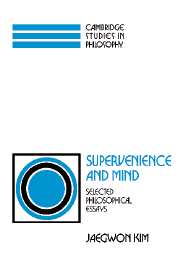Book contents
- Frontmatter
- Contents
- Preface
- Sources
- Part I Events and supervenience
- 1 Causation, nomic subsumption, and the concept of event
- 2 Noncausal connections
- 3 Events as property exemplifications
- 4 Concepts of supervenience
- 5 “Strong” and “global” supervenience revisited
- 6 Epiphenomenal and supervenient causation
- 7 Supervenience for multiple domains
- 8 Supervenience as a philosophical concept
- 9 Postscripts on supervenience
- Part II Mind and mental causation
- Index
7 - Supervenience for multiple domains
Published online by Cambridge University Press: 28 January 2010
- Frontmatter
- Contents
- Preface
- Sources
- Part I Events and supervenience
- 1 Causation, nomic subsumption, and the concept of event
- 2 Noncausal connections
- 3 Events as property exemplifications
- 4 Concepts of supervenience
- 5 “Strong” and “global” supervenience revisited
- 6 Epiphenomenal and supervenient causation
- 7 Supervenience for multiple domains
- 8 Supervenience as a philosophical concept
- 9 Postscripts on supervenience
- Part II Mind and mental causation
- Index
Summary
INTRODUCTION
The leading idea in the notion of “supervenience” is commonly explained this way: things that are indiscernible in respect of properties of one kind (the “base” or “subvenient” properties) are indiscernible in respect of properties of another kind (the “supervenient” properties). If moral properties are taken as supervenient properties and descriptive or naturalistic properties are taken as base properties, we have the doctrine of moral supervenience: the moral properties of persons, acts, and other objects supervene on their descriptive or naturalistic properties. Similarly, by taking mental properties as supervenient properties and physical properties as the base, we can formulate the doctrine of psychophysical supervenience: the psychological features of persons, organisms, etc., supervene on their physical characteristics.
Another familiar explanation of the idea goes like this: no difference in properties of one kindwithout a difference in properties of a second kind. Thus, as we say, there can be no difference in moral properties, unless there is some difference in descriptive, or nonmoral, properties. Inboth these initial characterizations, the things that have the supervenient properties areassumed to be also the things that have the base properties. If St. Francis is a good person, wesay, then anyone who has all the naturalistic properties that St. Francis has must also be a good person; this makes St. Francis and others the subjects of both moral and naturalistic properties.
- Type
- Chapter
- Information
- Supervenience and MindSelected Philosophical Essays, pp. 109 - 130Publisher: Cambridge University PressPrint publication year: 1993
- 4
- Cited by



